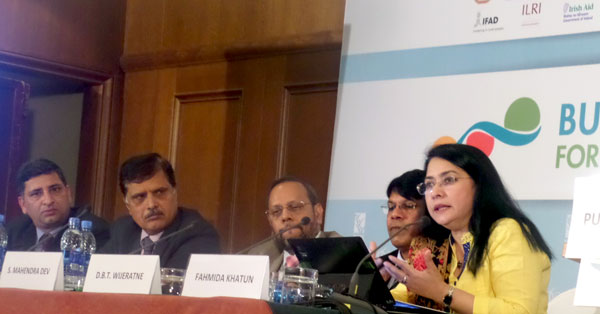Community-based adaptation programmes in Bangladesh need to be scaled up in order to cope with natural calamities that are being aggravated by the impacts of climate change.
Dr Fahmida Khatun, Research Director, CPD came up with the observation during her presentation as a Panellist at an International Conference on “Building Resilience for Food and Nutrition Security,” during 15-17 May 2014, in Addis Ababa, Ethiopia.
Organised by the International Food Policy Research Institute (IFPRI), the high-profile conference was inaugurated by Prime Minister of Ethiopia H. E. Hailemariam Desalegn and attended by policy makers, experts, donors, non-government organisations, civil society organisations, and the private sector from across the world.
During the session “Building Resilience to Nutrition Insecurity and Weather Shocks in South Asia,” which focused on what should be done to build resilience to weather shocks and resource scarcity in this region, Dr Khatun highlighted a number of resilience related issues in the context of nutrition and weather shocks from flood, cyclone and drought in Bangladesh.
[media url=”http://www.youtube.com/watch?v=tQYjFdO3jc4″ width=”600″ height=”400″ jwplayer=”controlbar=bottom”] [media url=”http://www.youtube.com/watch?v=J4uMavd0hDM” width=”600″ height=”400″ jwplayer=”controlbar=bottom”]Dr Khatun underscored that crises like sea level rise and water salinity affecting agricultural production and fisheries in the coastal areas; the scarcity of fresh water coupled with water salinity affecting agriculture; and rise in temperature lessening yield of major crops such as wheat and rice are other threats that Bangladesh should address.
She informed that several programmes and initiatives at the government and non-government levels are in operation in Bangladesh. “Community-based adaptation programmes by the people have been very useful in case of surviving through various weather events and sustaining their livelihoods that retained their nutritional status as well,” she opined.
“However, these programmes have to be scaled up through more resources and technologies by the government,” she emphasised.



